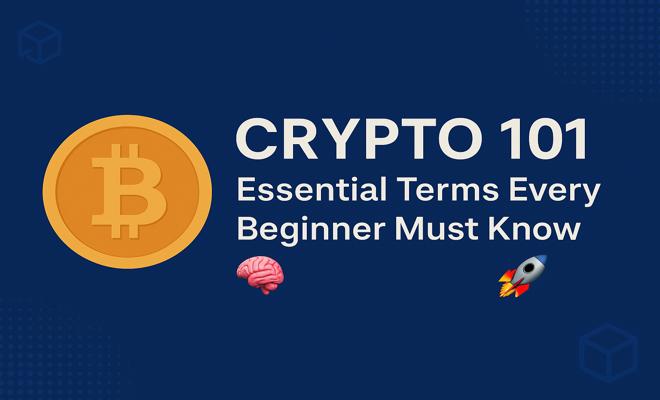
Crypto 101: Essential Terms Every Beginner Must Know 🧠🚀
Welcome to BitMedia24! 🚀 Whether you're just curious about cryptocurrency or ready to make your first investment, this beginner-friendly guide will help you understand the most important crypto terms in a simple and clear way. By the end of this article, you'll be able to navigate the world of digital assets with more confidence and less confusion. Let’s get started! 💡
🔐 What Is Cryptocurrency?
Cryptocurrency is a type of digital money that exists only online. Unlike regular currencies such as dollars or euros, cryptocurrencies are decentralized, meaning no single person, government, or bank controls them. Most cryptocurrencies operate on a system called blockchain, which keeps a secure and transparent record of all transactions.
💡 Why You Should Care
Cryptocurrencies are changing the way we think about money. They’re fast, borderless, and accessible to anyone with the internet. Learning crypto terms early helps you make smart choices, avoid scams, and take part in the future of finance.
📘 Key Cryptocurrency Terms Explained
Here’s a helpful glossary of terms that every beginner should know. These are the building blocks of your crypto education. 🧱
🔗 Blockchain
A blockchain is a digital ledger that records every crypto transaction. It’s decentralized, secure, and can't be changed. Think of it as a shared notebook that everyone can trust — no erasing or cheating allowed!
🪙 Coin vs Token
- Coin: A digital currency that runs on its own blockchain, like Bitcoin or Ethereum.
- Token: A digital asset built on another blockchain. For example, USDT is a token on the Ethereum network.
👛 Wallet
A wallet stores your cryptocurrency. There are two types:
- Custodial Wallet: Managed by a third party (like an exchange).
- Non-Custodial Wallet: You control your own private keys.
📈 Exchange
A platform where you can buy, sell, or trade crypto. Popular ones include Binance, Coinbase, and Kraken.
🔐 Private Key / Public Key
- Public Key: Your wallet address. You can safely share this to receive crypto.
- Private Key: A secret code that gives access to your funds. Never share it!
⛽ Gas Fee
The fee you pay to complete a transaction on a blockchain, especially on Ethereum. It varies based on network traffic.
📜 Smart Contract
A self-executing digital contract stored on the blockchain. It automatically performs actions when conditions are met, like sending payments or verifying agreements.
💼 DeFi (Decentralized Finance)
DeFi refers to financial services (like lending, borrowing, or earning interest) that operate without traditional banks, powered entirely by blockchain technology.
🎢 Volatility
Crypto prices can change fast — sometimes in seconds! This is called volatility. It's part of what makes crypto exciting, but also risky.
🧍 HODL
A fun misspelling of "hold" that stands for "Hold On for Dear Life." It means keeping your crypto instead of selling, even when prices go up or down.
😱 FOMO (Fear of Missing Out)
That anxious feeling that makes you buy a coin just because it's going up fast. Beware: FOMO can lead to poor decisions!
🐻 Bear Market / 🐂 Bull Market
- Bear Market: A period when crypto prices are falling.
- Bull Market: A period when prices are rising.
🧱 Layer 1 / Layer 2
- Layer 1: The main blockchain (like Ethereum or Solana).
- Layer 2: Solutions built on top of Layer 1 to speed up and reduce fees (like Polygon or Arbitrum).
🔄 Swap
Swapping means exchanging one cryptocurrency for another — quickly and directly, often using decentralized exchanges like Uniswap.
🧑🌾 Yield Farming / Staking
- Staking: Locking your crypto to support a network and earn rewards.
- Yield Farming: Moving your funds around DeFi platforms to get the highest returns.
📉 Rug Pull
A scam where developers vanish with investor money. Always research a project before investing!
🛡️ Security Essentials
🧾 Seed Phrase
A list of 12 to 24 words that acts as your backup key. Write it down and never store it online. If you lose it, you lose access to your wallet forever!
🔒 Cold Wallet vs Hot Wallet
- Cold Wallet: Offline storage (like a USB device) — very secure.
- Hot Wallet: Online and more convenient, but also more exposed to hackers.
⚠️ Phishing
A trick where hackers pretend to be trustworthy websites or people to steal your info. Always double-check URLs and never click on random links!
📚 Final Thoughts
Learning crypto terms is the first step to becoming a smart and confident participant in the digital economy. As the blockchain space grows, more terms will pop up, but these basics will always be relevant. 🧠
Bookmark this guide and come back whenever you need a refresher. And don’t forget to explore more crypto tutorials, news, and insights on BitMedia24. We're here to help you grow in your crypto journey! 🌍💼
Disclaimer: This article is for informational purposes only and should not be considered financial advice. Always do your own research before investing in cryptocurrencies.